(新课标) Unit 11 Section B 2a-2c 课件 (新目标英语七下 Unit 11 How was your school trip?)
文档属性
| 名称 | (新课标) Unit 11 Section B 2a-2c 课件 (新目标英语七下 Unit 11 How was your school trip?) | 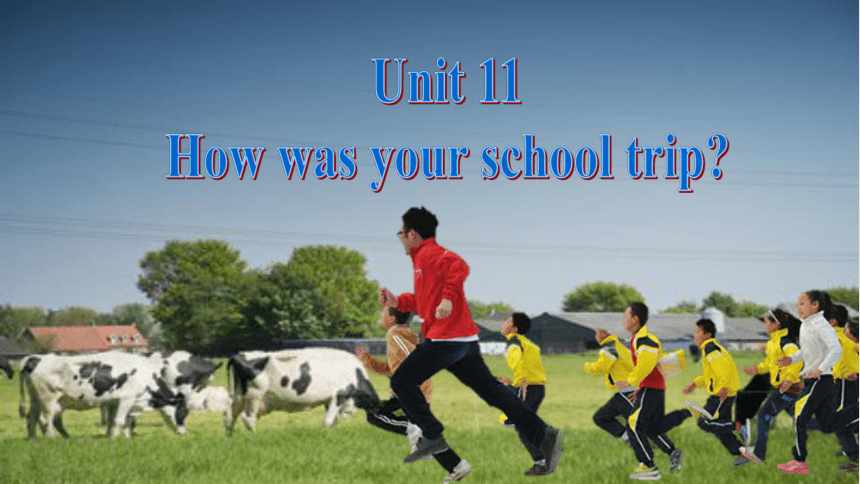 | |
| 格式 | pptx | ||
| 文件大小 | 21.7MB | ||
| 资源类型 | 试卷 | ||
| 版本资源 | 人教新目标(Go for it)版 | ||
| 科目 | 英语 | ||
| 更新时间 | 2024-05-16 20:53:44 | ||
图片预览

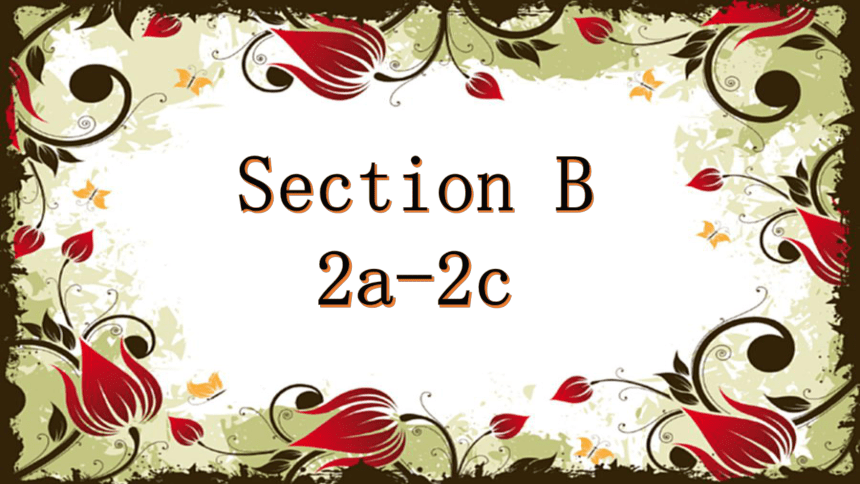
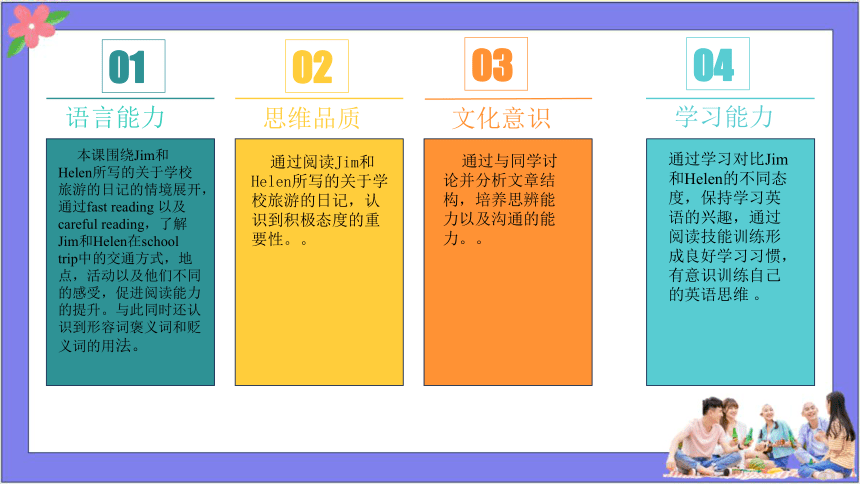
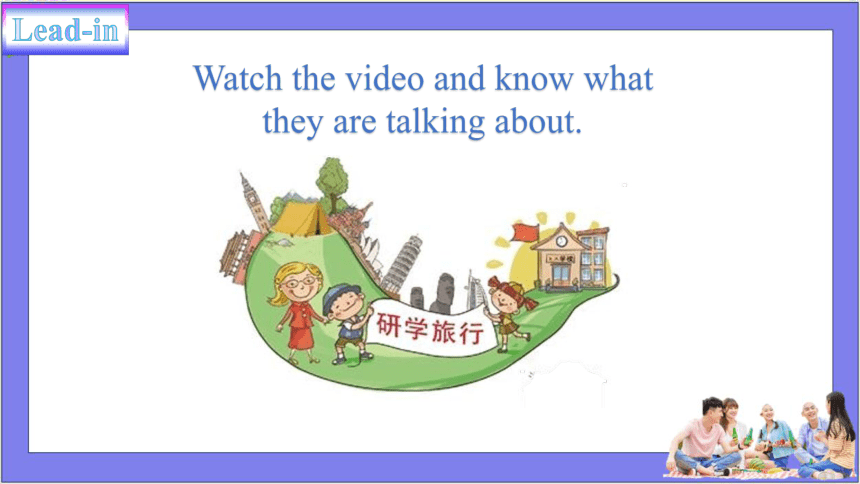
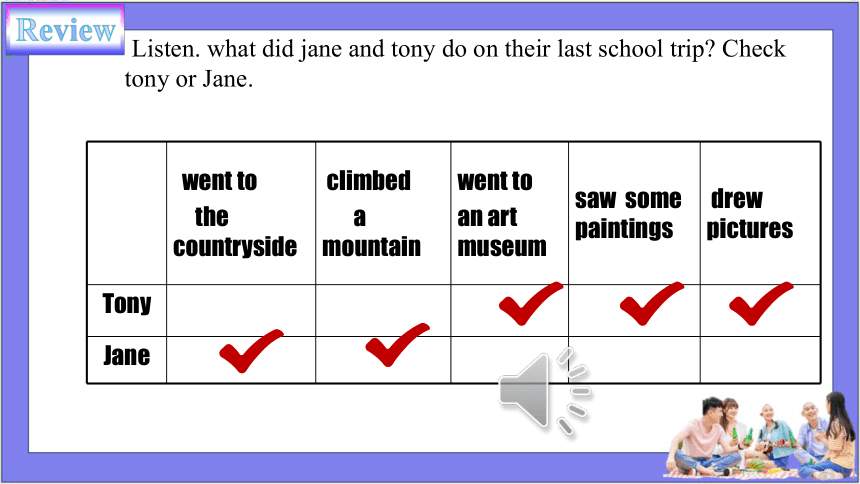
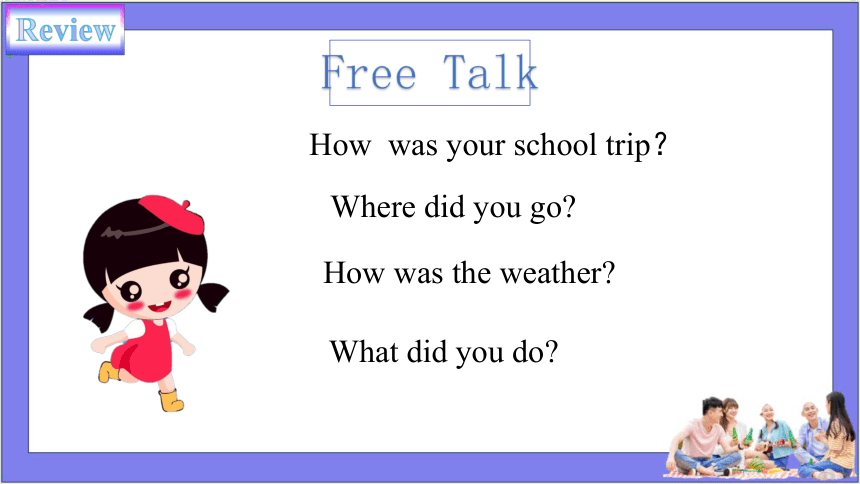
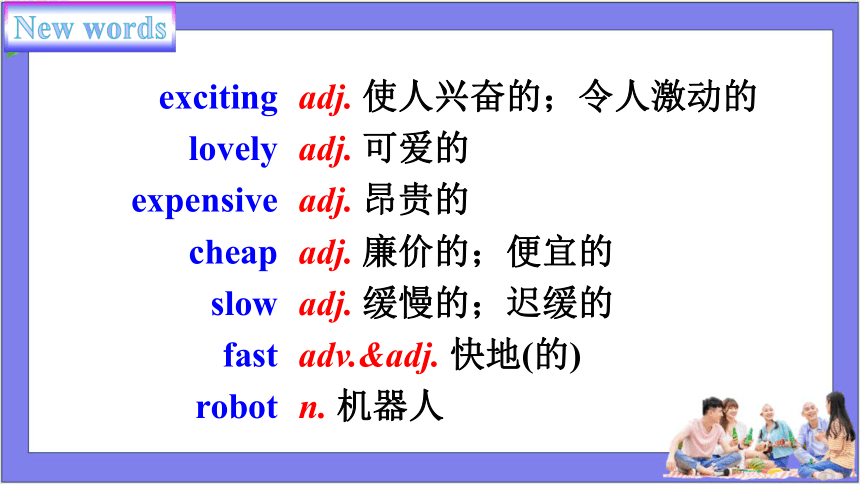
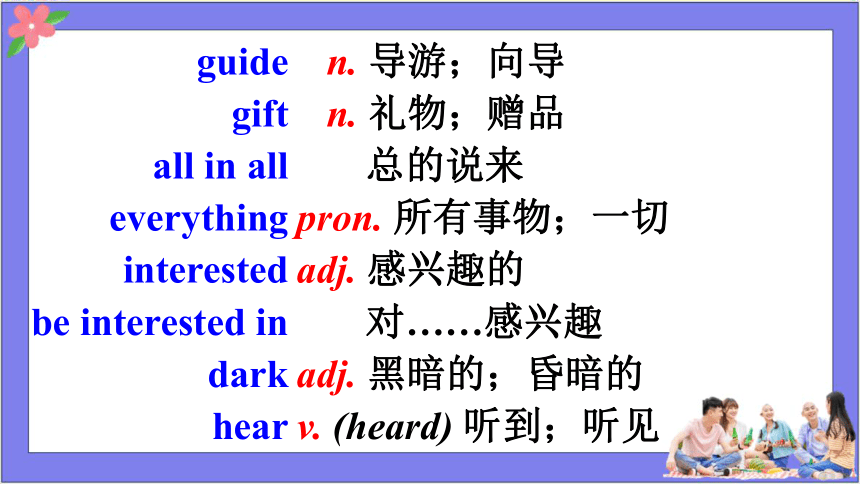
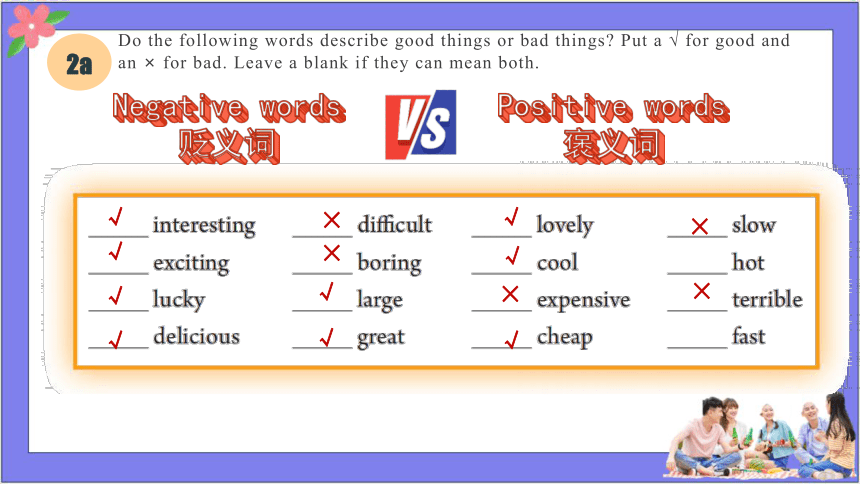
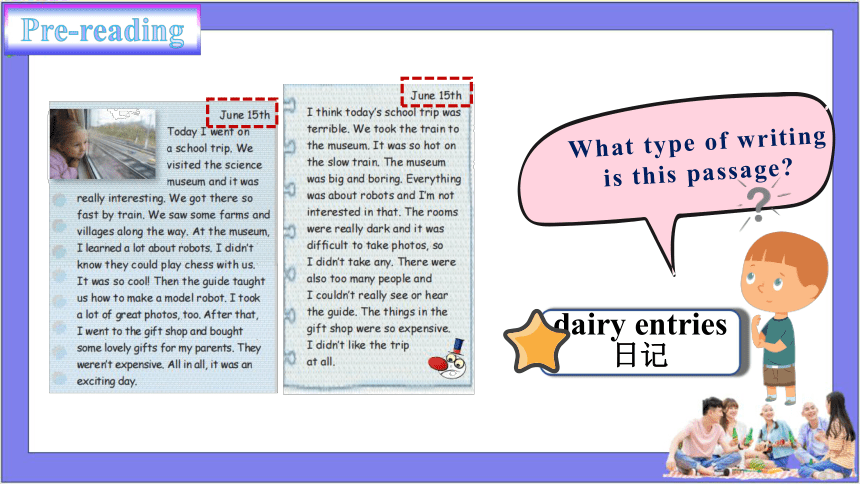
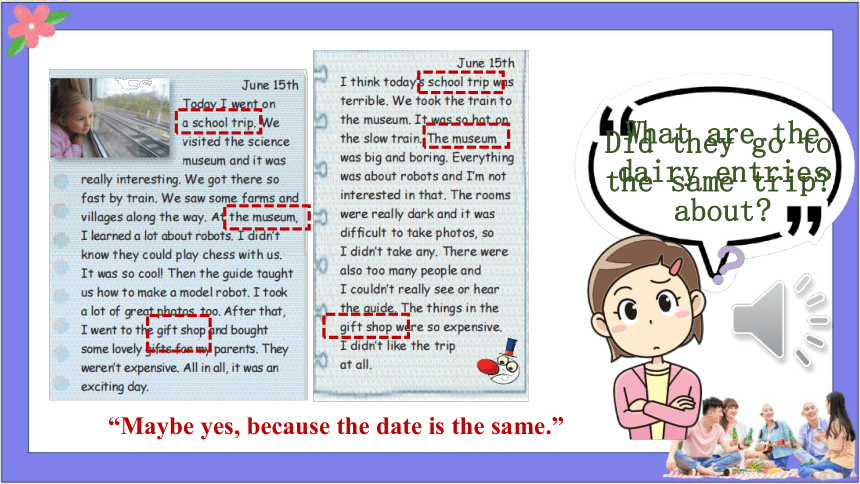
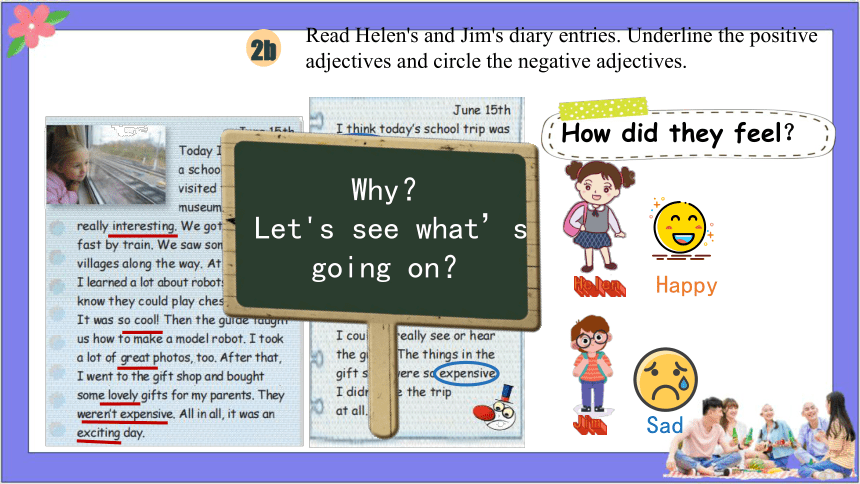
文档简介
(共43张PPT)
Unit 11
How was your school trip
Section B
2a-2c
01
02
03
04
语言能力
思维品质
文化意识
学习能力
本课围绕Jim和Helen所写的关于学校旅游的日记的情境展开,通过fast reading 以及careful reading,了解Jim和Helen在school trip中的交通方式,地点,活动以及他们不同的感受,促进阅读能力的提升。与此同时还认识到形容词褒义词和贬义词的用法。
通过阅读Jim和Helen所写的关于学校旅游的日记,认识到积极态度的重要性。。
通过与同学讨论并分析文章结构,培养思辨能力以及沟通的能力。。
通过学习对比Jim和Helen的不同态度,保持学习英语的兴趣,通过阅读技能训练形成良好学习习惯,有意识训练自己的英语思维 。
Lead-in
Watch the video and know what they are talking about.
Listen. what did jane and tony do on their last school trip Check tony or Jane.
went to the countryside climbed a mountain went to an art museum saw some paintings drew pictures
Tony
Jane
Review
Review
What did you do
Where did you go
How was the weather
How was your school trip?
Free Talk
exciting
lovely expensive
cheap
slow
fast
robot
adj. 使人兴奋的;令人激动的
adj. 可爱的
adj. 昂贵的
adj. 廉价的;便宜的
adj. 缓慢的;迟缓的
adv.&adj. 快地(的)
n. 机器人
New words
guide
gift
all in all
everything
interested
be interested in
dark
hear
n. 导游;向导
n. 礼物;赠品
总的说来
pron. 所有事物;一切
adj. 感兴趣的
对……感兴趣
adj. 黑暗的;昏暗的
v. (heard) 听到;听见
Do the following words describe good things or bad things Put a √ for good and an × for bad. Leave a blank if they can mean both.
2a
Negative words
贬义词
Positive words
褒义词
√
×
√
×
×
√
×
×
√
√
√
√
√
√
What type of writing is this passage
dairy entries
日记
Pre-reading
What are the dairy entries about
Did they go to the same trip
“Maybe yes, because the date is the same.”
How did they feel?
Read Helen's and Jim's diary entries. Underline the positive adjectives and circle the negative adjectives.
2b
Helen
Jim
Happy
Sad
Why?
Let's see what’s going on?
I was on a _______
The train was ______
slow train
so fast
Transportation
Helen
Jim
We saw __________
and _______ along
the way.
It was ________
hot
some farms
villages
learned a lot about robots
learned to make model robots
took a lot of photos
Helen
Jim
big and boring
robots were not interesting
didn’t take any photos
What happened at the museum
At museum
Things
Helen
Jim
Not expensive
Expensive
Bought some lovely gifts for her parents
Didn’t buy anything.
How did they think about things
Discuss with your partner and figure out the structure.
Introduction
Transportation
Place and things
Conclusion
Read after the tape.
Different people have different opinions about the same thing!
Helen
Jim
Same trip
Got nothing,
even a photo
took a lot of photos
learned a lot about robots
learned to make model robots
Post-reading
A Positive attitude is everthing
好心态决定一切
“用你的笑容去改变这个世界,别让这个世界改变了你的笑容。”
“一天很短,开心了就笑,不开心了就过会儿再笑。”
“如果人是乐观的,一切都有抵抗,一切都能抵抗,一切都会增强抵抗力。”
“乐观使你倾向于幸福健康事业顺利,悲观使你倾向于绝望患病失败忧郁孤独懦怯。”
2b
Read Helen’s and Jim’s diary entries and answer the questions.
1. Did Helen and Jim go on the same trip
2. How do they feel about the trip
Yes, Helen and Jim went on the same trip.
Helen thought the trip was great, but Jim didn’t like the trip at all.
Read the passage quickly and answer questions.
Helen Jim
Date
transportation
place
things
people
shop
June 15th
train
museum
robots
guide
gift shop
June 15th
train
museum
robots
guide
gift shop
They do (确实)went to a same school trip.
2c
1
Today went on a school trip.今天我参加学校旅行了
go on a school trip 意为“参加学校旅行”,是“go on a/an+名词”结构,意为“进行”
例: We went on school trip last week.上周我们参加了学校旅行。
知识拓展
go on picnic 去野餐
go on vacation 去度假
Language points
2
taught为 teach 的过去式,teach 此处作及物动词,后接“疑问词+动词不定式”
例: Let me teach you how to use the computer.
让我教你怎样使用电脑。
知识拓展
teach oneself 意为“自学”,相当于 learn by oneself.
例: She teaches herself English. =She learns English by herself.
她自学英语
Then the guide taught us how to make a model robot.
然后,导游教我们怎样制作一个机器人模型。
3
After that, l went to the gift shop and bought some lovely gifts for my parents.后来,我去了礼品店并为我的父母买了一些可爱的礼物。
lovely 形容词,意为“可爱的,美丽的”
例: What lovely girl! 多么可爱的一个女孩儿啊!We can see lovely views here.在这里我们能看到美丽的景色。
知识拓展
英语中有一些和 lovely 一样以-ly 结尾的词是形容词,而不是副词.
例: friendly 友好的lively 生动的,活跃的lonely 孤单的,寂寞的
4
All in all, it was an exciting day.总之,这是令人兴奋的一天。
all in all 意为“总的说来;总之;整体上说”,常用于句首,用来对所阐述的内容进行概括性总结及归纳。
例: All in all, it is a great success.总的说来,它非常成功。
辨析: all in all, in all 与 at all
all in all 意为“总的说来”,常用于句首
in all 意为“总共,合计”,既可放在句首,也可放在句末
at all 意为“根本,常用于否定句中;not...at all 意为“根本不;完全不
everything 为复合不定代词,意为“所有事物;一切”
例: Many parents try to do everything for their children.许多父母努力为他们的孩子做所有的事情。
【注意】
①everything 作主语时,谓语动词用单数形式例: Everything is cheap here.这里的一切都很便宜。
②everything, anything 等复合不定代词被形容词修饰时,形容词应置于这些复合不定代词的后面。
5
Everything was about robots and I'm no interested in that.一切都是关于机器人的,我对那方面不感兴趣。
要点 1
1.There is or somebody near us.
2.We didn’t have to tell you.
3.Could you please give me to eat
4.I love my father. He is to me.
something
anything
something
everything
用 something, anything, everything 填空
interested 形容词,意为“感兴趣的"。be interested in 意为“对.感兴趣”;be interested in doing sth.意为“对做某事感兴趣”
例: I'm very interested in history.我对历史很感兴趣。
5
Everything was about robots and I'm no interested in that.一切都是关于机器人的,我对那方面不感兴趣。
要点 2
辨析interested与interesting
interested 意为“感兴趣的”,常用于修饰或描述人interesting 意为“有趣的,令人感兴趣的”,常用来修饰或描述物例: He is interested in the interesting book.他对那本有趣的书感兴趣。
用 interesting, interested 填空
1. The story is ___________, I am especially _____________ in the ending.
2. My brother was ____________ in street dancing.
3.Liu Tao is very in football.
4.I like the storybook because It’s very .
5. Tom is very _____________, we all like him.
interested
interesting
interesting
interested
interested
interesting
6
There were also too many people and l couldn't really see or hear the guide.里面也有太多的人,我真的看不见导游,也听不清导游的解说
hear 此处作及物动词,意为“听到;听见”,其过去式为 heard
例:In the middle of the night. heard strange noise in the wind.半夜里我听到风中有一种奇怪的声音。
辨析 hear与listen,listen to
hear,意思是“听见”,表示一种动作后的结果。
listen,意思是“听”,表示一种动作。这是个不及物动词,后面不能直接接宾语。
listen to 表示“听某人说”,后面必须接宾语。
7
today’s school trip
表示有生命的东西的名词及某些表示时间、距离、星球、世界、国家等无生命的东西的名词后加 ’s来表示所有关系,叫做名词所有格。
例如: men’s room 男厕所
a mile’s distance 一英里的距离
但如果该名词是以-s或-es接尾,则只在该名词后加“’”来构成所有格。
例如: 3 hours’ walk 三小时的路程
five minutes’ walk 五分钟路程
two miles’ distance 两英里的距离
用 hear, listen 填空
1.Can you what I said
2. ! Someone is singing in the classroom.
3. I like ________ to music in my free time.
4. This morning I _________our teacher was interested in skating.
5. He didn’t _________ to the doctor, so he is getting worse now.
hear
Listen
listening
heard
listen
7
I didn't like the trip at all. 我一点儿都不喜欢这次旅行
not...at all. 意为“根本不;完全不”
例: I don't like eating meat at all. 我一点儿都不喜欢吃肉。
知识拓展
not at all 用来回答感谢,意为“不用谢;不客气”,是一种比较正式的用法。
例: -Thank you very much. 多谢你了。-Not at all. 不用谢,
Exercises
一、根据句意及汉语提示写单词。
1.My sister is a _______ (导游) and she loves her job.
2.The bus was too slow.Let's take a _____ (快的) train.
3.Alice is my good friend and she is a _______ (可爱的) girl.
4.The ring was too ____________(昂贵的), so he didn't buy it.
5.I'm sure _____________(所有事情) will be all right in the end.
guide
fast
lovely
expensive
everything
二、根据句意及首字母提示写单词。
1.The hat is very c_____ and it is only five dollars.
2.I like soccer games because they are e________.
3.We can h_____ a man singing in the hall.
4.Linda got many g_____ from her friends on her birthday.
5.The room is d______ and I can't see anything in it.
cheap
exciting
hear
gifts
dark
1.It's such an ________film that all the students are ________ in it.
A.interesting;interested B.interesting;interesting
C.interested;interested D.interested;interesting
2.The food in that restaurant is ___________.We don’ t want to eat there.
A.high B.low C.expensive D.clean
3.Sorry, the shop is too noisy. I can't ________ you. Can I call you back later
A.hear B.heard C.listen to D.listened to
三、单项选择
A
C
A
四、根据汉语意思完成下列句子翻译。
1.玛丽对体育节目不感兴趣。
Mary is not __________ ___ sport shows.
2.总的来说,杰克是个好学生。
_____ ____ ______,Jack is a good student.
3.这次旅行一点儿意思都没有。
The trip wasn't interesting _____ _____.
4.沿路我们看见了很多山。
We saw lots of mountains ________ _____ _____.
interested in
All in all
at all
along the way
Helen’s trip
Introduction
Body
Conclusion
by train
All in all, it was an day.
Feelings
How
Where
What
museum
took....
went....
learn....
exciting
saw...along the way
Happy
Jim’ s trip
Introduction
Body
Conclusion
by train
Feelings
How
Where
What
museum
hot and slow
I ______ like the trip ________.
didn’t
at all
guide
gifts
expensive
couldn’t see or hear
robots
not interested in
Sad
Level B:
1. Master what you have learned in this lesson.
2. Preview the conversation in 2d
Level A:
1. Finish the extra exercise in your workbook.
2. Preview the reading section in section B
Thank you !
Unit 11
How was your school trip
Section B
2a-2c
01
02
03
04
语言能力
思维品质
文化意识
学习能力
本课围绕Jim和Helen所写的关于学校旅游的日记的情境展开,通过fast reading 以及careful reading,了解Jim和Helen在school trip中的交通方式,地点,活动以及他们不同的感受,促进阅读能力的提升。与此同时还认识到形容词褒义词和贬义词的用法。
通过阅读Jim和Helen所写的关于学校旅游的日记,认识到积极态度的重要性。。
通过与同学讨论并分析文章结构,培养思辨能力以及沟通的能力。。
通过学习对比Jim和Helen的不同态度,保持学习英语的兴趣,通过阅读技能训练形成良好学习习惯,有意识训练自己的英语思维 。
Lead-in
Watch the video and know what they are talking about.
Listen. what did jane and tony do on their last school trip Check tony or Jane.
went to the countryside climbed a mountain went to an art museum saw some paintings drew pictures
Tony
Jane
Review
Review
What did you do
Where did you go
How was the weather
How was your school trip?
Free Talk
exciting
lovely expensive
cheap
slow
fast
robot
adj. 使人兴奋的;令人激动的
adj. 可爱的
adj. 昂贵的
adj. 廉价的;便宜的
adj. 缓慢的;迟缓的
adv.&adj. 快地(的)
n. 机器人
New words
guide
gift
all in all
everything
interested
be interested in
dark
hear
n. 导游;向导
n. 礼物;赠品
总的说来
pron. 所有事物;一切
adj. 感兴趣的
对……感兴趣
adj. 黑暗的;昏暗的
v. (heard) 听到;听见
Do the following words describe good things or bad things Put a √ for good and an × for bad. Leave a blank if they can mean both.
2a
Negative words
贬义词
Positive words
褒义词
√
×
√
×
×
√
×
×
√
√
√
√
√
√
What type of writing is this passage
dairy entries
日记
Pre-reading
What are the dairy entries about
Did they go to the same trip
“Maybe yes, because the date is the same.”
How did they feel?
Read Helen's and Jim's diary entries. Underline the positive adjectives and circle the negative adjectives.
2b
Helen
Jim
Happy
Sad
Why?
Let's see what’s going on?
I was on a _______
The train was ______
slow train
so fast
Transportation
Helen
Jim
We saw __________
and _______ along
the way.
It was ________
hot
some farms
villages
learned a lot about robots
learned to make model robots
took a lot of photos
Helen
Jim
big and boring
robots were not interesting
didn’t take any photos
What happened at the museum
At museum
Things
Helen
Jim
Not expensive
Expensive
Bought some lovely gifts for her parents
Didn’t buy anything.
How did they think about things
Discuss with your partner and figure out the structure.
Introduction
Transportation
Place and things
Conclusion
Read after the tape.
Different people have different opinions about the same thing!
Helen
Jim
Same trip
Got nothing,
even a photo
took a lot of photos
learned a lot about robots
learned to make model robots
Post-reading
A Positive attitude is everthing
好心态决定一切
“用你的笑容去改变这个世界,别让这个世界改变了你的笑容。”
“一天很短,开心了就笑,不开心了就过会儿再笑。”
“如果人是乐观的,一切都有抵抗,一切都能抵抗,一切都会增强抵抗力。”
“乐观使你倾向于幸福健康事业顺利,悲观使你倾向于绝望患病失败忧郁孤独懦怯。”
2b
Read Helen’s and Jim’s diary entries and answer the questions.
1. Did Helen and Jim go on the same trip
2. How do they feel about the trip
Yes, Helen and Jim went on the same trip.
Helen thought the trip was great, but Jim didn’t like the trip at all.
Read the passage quickly and answer questions.
Helen Jim
Date
transportation
place
things
people
shop
June 15th
train
museum
robots
guide
gift shop
June 15th
train
museum
robots
guide
gift shop
They do (确实)went to a same school trip.
2c
1
Today went on a school trip.今天我参加学校旅行了
go on a school trip 意为“参加学校旅行”,是“go on a/an+名词”结构,意为“进行”
例: We went on school trip last week.上周我们参加了学校旅行。
知识拓展
go on picnic 去野餐
go on vacation 去度假
Language points
2
taught为 teach 的过去式,teach 此处作及物动词,后接“疑问词+动词不定式”
例: Let me teach you how to use the computer.
让我教你怎样使用电脑。
知识拓展
teach oneself 意为“自学”,相当于 learn by oneself.
例: She teaches herself English. =She learns English by herself.
她自学英语
Then the guide taught us how to make a model robot.
然后,导游教我们怎样制作一个机器人模型。
3
After that, l went to the gift shop and bought some lovely gifts for my parents.后来,我去了礼品店并为我的父母买了一些可爱的礼物。
lovely 形容词,意为“可爱的,美丽的”
例: What lovely girl! 多么可爱的一个女孩儿啊!We can see lovely views here.在这里我们能看到美丽的景色。
知识拓展
英语中有一些和 lovely 一样以-ly 结尾的词是形容词,而不是副词.
例: friendly 友好的lively 生动的,活跃的lonely 孤单的,寂寞的
4
All in all, it was an exciting day.总之,这是令人兴奋的一天。
all in all 意为“总的说来;总之;整体上说”,常用于句首,用来对所阐述的内容进行概括性总结及归纳。
例: All in all, it is a great success.总的说来,它非常成功。
辨析: all in all, in all 与 at all
all in all 意为“总的说来”,常用于句首
in all 意为“总共,合计”,既可放在句首,也可放在句末
at all 意为“根本,常用于否定句中;not...at all 意为“根本不;完全不
everything 为复合不定代词,意为“所有事物;一切”
例: Many parents try to do everything for their children.许多父母努力为他们的孩子做所有的事情。
【注意】
①everything 作主语时,谓语动词用单数形式例: Everything is cheap here.这里的一切都很便宜。
②everything, anything 等复合不定代词被形容词修饰时,形容词应置于这些复合不定代词的后面。
5
Everything was about robots and I'm no interested in that.一切都是关于机器人的,我对那方面不感兴趣。
要点 1
1.There is or somebody near us.
2.We didn’t have to tell you.
3.Could you please give me to eat
4.I love my father. He is to me.
something
anything
something
everything
用 something, anything, everything 填空
interested 形容词,意为“感兴趣的"。be interested in 意为“对.感兴趣”;be interested in doing sth.意为“对做某事感兴趣”
例: I'm very interested in history.我对历史很感兴趣。
5
Everything was about robots and I'm no interested in that.一切都是关于机器人的,我对那方面不感兴趣。
要点 2
辨析interested与interesting
interested 意为“感兴趣的”,常用于修饰或描述人interesting 意为“有趣的,令人感兴趣的”,常用来修饰或描述物例: He is interested in the interesting book.他对那本有趣的书感兴趣。
用 interesting, interested 填空
1. The story is ___________, I am especially _____________ in the ending.
2. My brother was ____________ in street dancing.
3.Liu Tao is very in football.
4.I like the storybook because It’s very .
5. Tom is very _____________, we all like him.
interested
interesting
interesting
interested
interested
interesting
6
There were also too many people and l couldn't really see or hear the guide.里面也有太多的人,我真的看不见导游,也听不清导游的解说
hear 此处作及物动词,意为“听到;听见”,其过去式为 heard
例:In the middle of the night. heard strange noise in the wind.半夜里我听到风中有一种奇怪的声音。
辨析 hear与listen,listen to
hear,意思是“听见”,表示一种动作后的结果。
listen,意思是“听”,表示一种动作。这是个不及物动词,后面不能直接接宾语。
listen to 表示“听某人说”,后面必须接宾语。
7
today’s school trip
表示有生命的东西的名词及某些表示时间、距离、星球、世界、国家等无生命的东西的名词后加 ’s来表示所有关系,叫做名词所有格。
例如: men’s room 男厕所
a mile’s distance 一英里的距离
但如果该名词是以-s或-es接尾,则只在该名词后加“’”来构成所有格。
例如: 3 hours’ walk 三小时的路程
five minutes’ walk 五分钟路程
two miles’ distance 两英里的距离
用 hear, listen 填空
1.Can you what I said
2. ! Someone is singing in the classroom.
3. I like ________ to music in my free time.
4. This morning I _________our teacher was interested in skating.
5. He didn’t _________ to the doctor, so he is getting worse now.
hear
Listen
listening
heard
listen
7
I didn't like the trip at all. 我一点儿都不喜欢这次旅行
not...at all. 意为“根本不;完全不”
例: I don't like eating meat at all. 我一点儿都不喜欢吃肉。
知识拓展
not at all 用来回答感谢,意为“不用谢;不客气”,是一种比较正式的用法。
例: -Thank you very much. 多谢你了。-Not at all. 不用谢,
Exercises
一、根据句意及汉语提示写单词。
1.My sister is a _______ (导游) and she loves her job.
2.The bus was too slow.Let's take a _____ (快的) train.
3.Alice is my good friend and she is a _______ (可爱的) girl.
4.The ring was too ____________(昂贵的), so he didn't buy it.
5.I'm sure _____________(所有事情) will be all right in the end.
guide
fast
lovely
expensive
everything
二、根据句意及首字母提示写单词。
1.The hat is very c_____ and it is only five dollars.
2.I like soccer games because they are e________.
3.We can h_____ a man singing in the hall.
4.Linda got many g_____ from her friends on her birthday.
5.The room is d______ and I can't see anything in it.
cheap
exciting
hear
gifts
dark
1.It's such an ________film that all the students are ________ in it.
A.interesting;interested B.interesting;interesting
C.interested;interested D.interested;interesting
2.The food in that restaurant is ___________.We don’ t want to eat there.
A.high B.low C.expensive D.clean
3.Sorry, the shop is too noisy. I can't ________ you. Can I call you back later
A.hear B.heard C.listen to D.listened to
三、单项选择
A
C
A
四、根据汉语意思完成下列句子翻译。
1.玛丽对体育节目不感兴趣。
Mary is not __________ ___ sport shows.
2.总的来说,杰克是个好学生。
_____ ____ ______,Jack is a good student.
3.这次旅行一点儿意思都没有。
The trip wasn't interesting _____ _____.
4.沿路我们看见了很多山。
We saw lots of mountains ________ _____ _____.
interested in
All in all
at all
along the way
Helen’s trip
Introduction
Body
Conclusion
by train
All in all, it was an day.
Feelings
How
Where
What
museum
took....
went....
learn....
exciting
saw...along the way
Happy
Jim’ s trip
Introduction
Body
Conclusion
by train
Feelings
How
Where
What
museum
hot and slow
I ______ like the trip ________.
didn’t
at all
guide
gifts
expensive
couldn’t see or hear
robots
not interested in
Sad
Level B:
1. Master what you have learned in this lesson.
2. Preview the conversation in 2d
Level A:
1. Finish the extra exercise in your workbook.
2. Preview the reading section in section B
Thank you !
同课章节目录
- Unit 1 Can you play the guitar?
- Section A
- Section B
- Unit 2 What time do you go to school?
- Section A
- Section B
- Unit 3 How do you get to school?
- Section A
- Section B
- Unit 4 Don't eat in class.
- Section A
- Section B
- Unit 5 Why do you like pandas?
- Section A
- Section B
- Unit 6 I'm watching TV.
- Section A
- Section B
- Review of Units 1-6
- Unit 7 It's raining!
- Section A
- Section B
- Unit 8 Is there a post office near here?
- Section A
- Section B
- Unit 9 What does he look like?
- Section A
- Section B
- Unit 10 I'd like some noodles.
- Section A
- Section B
- Unit 11 How was your school trip?
- Section A
- Section B
- Unit 12 What did you do last weekend?
- Section A
- Section B
